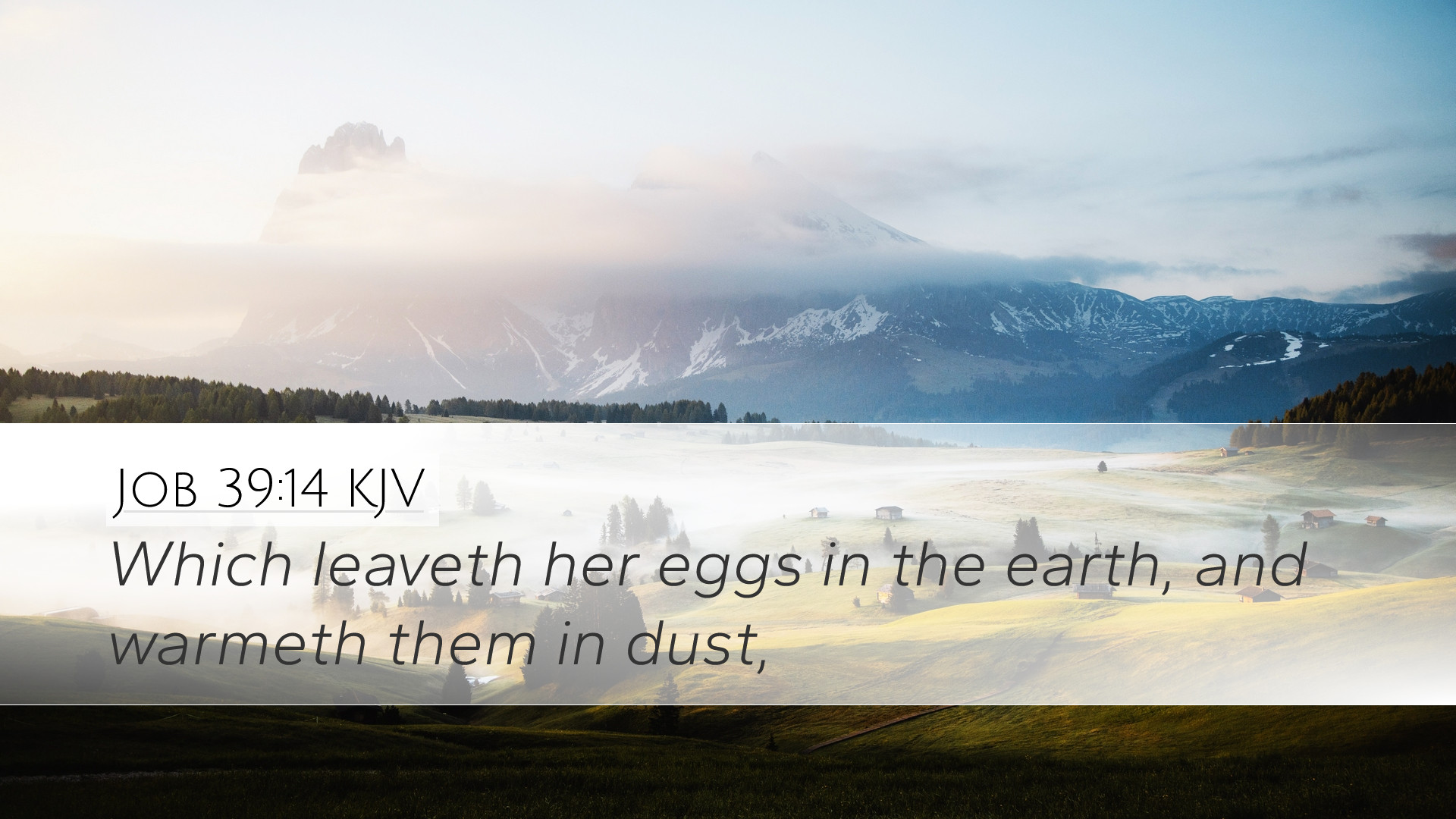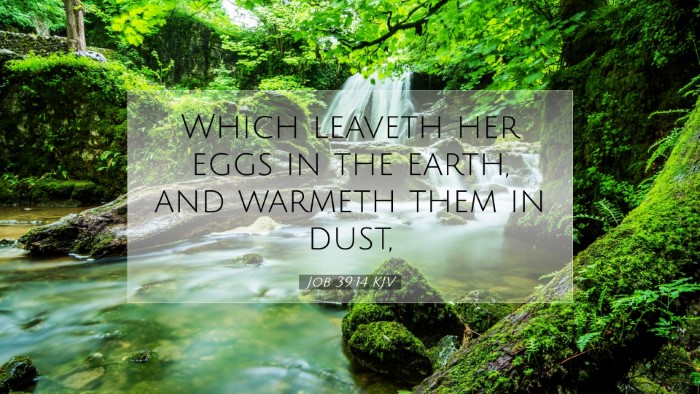Old Testament
Genesis Exodus Leviticus Numbers Deuteronomy Joshua Judges Ruth 1 Samuel 2 Samuel 1 Kings 2 Kings 1 Chronicles 2 Chronicles Ezra Nehemiah Esther Job Psalms Proverbs Ecclesiastes Song of Solomon Isaiah Jeremiah Lamentations Ezekiel Daniel Hosea Joel Amos Obadiah Jonah Micah Nahum Habakkuk Zephaniah Haggai Zechariah MalachiJob 39:14
Job 39:14 KJV
Which leaveth her eggs in the earth, and warmeth them in dust,
Job 39:14 Bible Commentary
Commentary on Job 39:14
Scriptural Context: Job 39:14 states:
“She layeth upon her eggs, and warmeth them in the dust.”
This verse is located within a larger discourse where God speaks to Job, presenting a series of rhetorical questions that highlight the majesty and wisdom of His creation. In this section, God contrasts the wisdom of humans with the instinctual nature of various animals.
Exegesis of Job 39:14
This verse focuses on the natural behavior of birds, specifically in the context of their reproductive habits. The “she” referred to is the female bird that lays her eggs, indicative of the nurturing role that is intrinsic to the continuation of life within the animal kingdom.
Insights from Matthew Henry
Nature's Wisdom: Matthew Henry emphasizes how God’s providence over creation can be observed in the instinctual behaviors of animals. The verse illustrates the power of instinct, as the bird is entirely reliant on nature to guide its actions.
Divine Oversight: Henry notes that even as a simple act such as laying eggs is performed, God's overarching plan for creation is evident. It serves as a reminder that all creation is under His sovereign command, and even within the spheres of animal life, there exist intricate divine principles at play.
Insights from Albert Barnes
Contrast with Humanity: Albert Barnes explores the theme of deep-seated instinct in animals compared to human judgment. While humans question and contemplate, animals act according to their God-given instincts. This fundamental divergence is one of the key elements that God uses to counsel Job amidst his suffering.
Symbol of Care: Barnes also draws attention to the imagery of warmth and care that the mother bird exhibits towards her eggs, suggesting a nurturing disposition that is ingrained in nature. This nurturing instinct is evidence of God's design in fostering life, contrasting with the chaos and suffering Job experiences.
Insights from Adam Clarke
Illustration of Divine Wisdom: Adam Clarke provides a broader understanding of this verse by drawing parallels between the behavior of the animal world and that of human beings, particularly in terms of wisdom and guidance. Clarke argues that the basic instincts displayed by the bird reflect a perpendicularity to acquired human wisdom.
Natural Order: Clarke emphasizes that the natural order observed in the animal kingdom offers insight into the divine order established by God. The act of incubating eggs connects to the idea of persistence and care, reflecting God's faithfulness in overseeing His creation.
Theological Implications
Understanding God's Creation: The observation made in Job 39:14 encourages deeper consideration of how God has created a world operating on certain principles and instincts. It prompts the readers to reflect on the complexity of creation and the intricate balance that sustains life.
Rest in Divine Sovereignty: For pastors and theologians, this verse serves as a powerful reminder of God's sovereignty. Even amidst human suffering and despair, the behavior of a simple bird can remind believers of God's control over all living things and the ultimate good that can arise from His design.
Applications for Ministry and Academia
Encouraging Trust in God: Pastors can utilize this verse to encourage their congregations to trust in God's creation and His management of the world. This may be particularly meaningful in times of distress or uncertainty, reminding believers of the simplicity and trust displayed in nature.
Deepening Theological Study: For students and scholars, Job 39:14 opens doors to study related scriptural themes, such as creation, instinct, and divine oversight. The different perspectives from various commentaries offer a wealth of insight that can enhance understanding and provide a comprehensive view of God's interaction with His creation.
Conclusion
Job 39:14 is more than a mere observation about a bird laying eggs; it encapsulates profound theological issues about creation, instinct, and God's sovereignty over all life. By reflecting on insights from respected commentaries, readers are invited to deepen their understanding and appreciation of God's wisdom manifested in the natural world.


